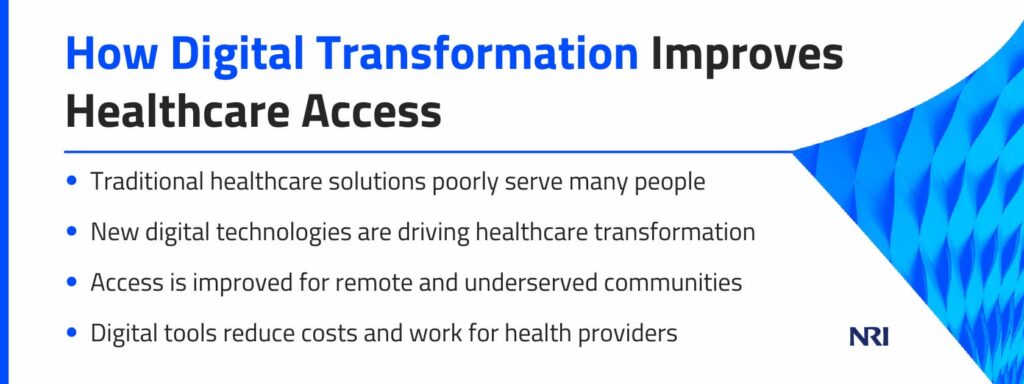最新のデジタルツールを使うことで、医療提供者は患者により公平で効率的なソリューションを提供することができる。

現代の医療は、遠隔地でのケアへのアクセスに悩む患者から、コスト上昇や業務の非効率性に悩む医療提供者まで、さまざまな課題に直面しています。デジタルトランスフォーメーションは、遠隔医療、患者ポータル、クラウドインフラストラクチャなどの革新的なソリューションを提供し、アクセスを改善し、ケア提供を強化し、医療提供者の業務を合理化することで、ゲームを変えようとしています。
「ヘルスケアにおけるデジタルトランスフォーメーションは、テクノロジーだけの問題ではありません。「医療におけるデジタルトランスフォーメーションは、テクノロジーだけの問題ではありません。NRIでは、プロバイダーが患者に最高の体験を提供し、介護者の幸福をサポートし、効率を高めることができるよう支援します。"
デジタルトランスフォーメーションなき医療アクセスの課題
従来の医療は深刻な課題に直面しており、その多くは患者のアクセスに関連している。
例えば、人里離れた農村部に住む人々は、必要なサービスを受けることが難しく、しばしば遠距離の移動を余儀なくされることがある。全米農村保健協会(National Rural Health Association)は、非都市部における患者と一次医療を担う医師の比率は39.8人であると指摘している。人口10万人。都市部では10万人当たり53.3人である。専門医(腫瘍医や整形外科医など)の場合はさらに顕著で、農村部では人口10万人あたり約30人、都市部では263人である。
患者は指定された医療機関があっても、交通手段がないために都合よく受診できなかったり、診療所の診療時間が自分の都合に合わなかったりする。こうした障壁に加え、診察や治療に長い待ち時間がかかり、適切な医療を受けることが難しい場合もある。
医療提供者の視点から見ると、従来のモデルでは、需要の高まりや最新のイノベーションの採用など、患者への対応方法を変革するための拡張性に限界がある。
ヘルスケアのデジタルトランスフォーメーションを推進するテクノロジー
このような課題やその他の課題に対処するため、 ヘルスケアにおけるデジタルワークプレイスの進化が起こっており、ケアの提供方法が変化している。.これらの変化には以下が含まれる:
遠隔医療プラットフォーム
遠隔医療プラットフォームはケア提供を拡大し、バーチャル診察、遠隔患者モニタリング、AI(人工知能ソリューション)を通じて業界を再構築している。
広範なケアサービスを提供するため、バーチャル診察では、高精細ビデオ、安全なデータ伝送、AIを活用した事前スクリーニングを使用することができる。これらのサービスは、待ち時間の短縮、ケアの継続性の確保、患者がどこに住んでいても必要な医療専門家へのアクセスを可能にする。
遠隔患者モニタリング(RPM)により、医療機関は遠くから患者のグルコースレベル、心拍数、血圧、その他のバイタルサインをモニターし、援助が必要な場合にのみ患者を呼び出すことができる。これにより、患者の転帰を改善し、医療費を削減することができる。
AIは業務を合理化し、より良い診断を下し、オーダーメイドの治療を可能にするなど、多くのことを可能にする。
患者ポータル
患者ポータルは、人々とのエンゲージメントを高め、医療機関の効率を高め、管理負担を軽減するのに役立ちます。患者ポータルはまた
- 患者が自分の健康情報に簡単にアクセスできるようにする
- 予約を簡単に入れる
- 簡単な処方箋の補充を可能にする
- 患者が質問できるよう、安全な通信を提供する
- 異なる医療提供者間のより良い連携を促進する。
モバイルヘルスアプリ
モバイルヘルスアプリは、一般的な健康やウェルネス、バーチャルケアのための遠隔医療、健康管理など、さまざまな目的を果たす。
健康管理アプリを使えば、心臓病、糖尿病、妊娠、メンタルヘルスなど、特定の状態をモニターすることができる。また、医療提供者は健康レポートや医療記録を遠隔で共有し、患者のエンゲージメントとケアコーディネーションを強化することができる。
クラウド・インフラ
革新的で信頼性が高く、安全な医療サービスを提供するためには、適切なクラウドインフラストラクチャが必要です。クラウドは、プロバイダーが手頃な価格で質の高い患者ケアを提供する方法を劇的に変えることができます。
例えば、クラウドベースのハイブリッドITインフラは、以下のような役割を果たすことができる:
- デジタルトランスフォーメーションをサポート
- データ・セキュリティの向上
- データに基づく意思決定への貢献
- デジタル記録管理の改善
- 拡張を容易にする
- より患者中心のアプローチを採用するための支援
- コラボレーションの強化
- アプリケーション、デバイス、システム間でのデータ共有が可能
患者と医療提供者にとってのデジタルトランスフォーメーションのメリット
デジタルトランスフォーメーションは、医療提供者の管理負担と運営コストを軽減しながら、患者、特に地方や十分なサービスを受けていない地域の患者により良い医療サービスを提供するのに役立ちます。組織はまた、より改善された、より手頃な価格のサービスを提供することで、患者のエンゲージメントと満足度を高めることができる。
ハーバード・ビジネス・レビュー』誌は、テクノロジーは病院や診療所の人員配置計画、サプライチェーン・マネジメントの改善とコスト削減にも一役買い、意思決定支援システムは「トリアージ、入院、退院の意思決定に役立つ貴重な洞察を提供できる」と指摘している。
デジタルヘルスケアの変革におけるNRIの役割
NRIは、テレヘルス、患者ポータル、ITの近代化など、カスタマイズされた「ヘルスケアソリューション」のリーダーです。これまでに、13万人以上の医師がテクノロジーによってより良い仕事ができるように、また80以上の病院が最新のデジタル技術によって近代化できるように支援してきました。
たとえば、メリーランド州フレデリック郡で最大の医療提供者であるフレデリック・ヘルス社とは、患者体験をより速く、より良く、より安全にするために協力しました。フレデリック・ヘルス社では、患者体験をより速く、より良く、より安全にするために、メリーランド州フレデリック郡最大の医療機関であるフレデリック・ヘルス社と協力しました。
当社のスケーラブルなソリューションは、フレデリック・ヘルスが合理化されたコールセンターと、より安全なインフラを導入するのを支援し、250人の医師に提供された無料のWebexライセンスを通じて、患者とのコミュニケーションの改善を可能にしました。
あなたの組織は、デジタルトランスフォーメーションの旅を始めたいとお考えですか?まずはNRIにご相談ください。組織の技術的健全性を高めることで、顧客により良い医療を提供できるようになります。



